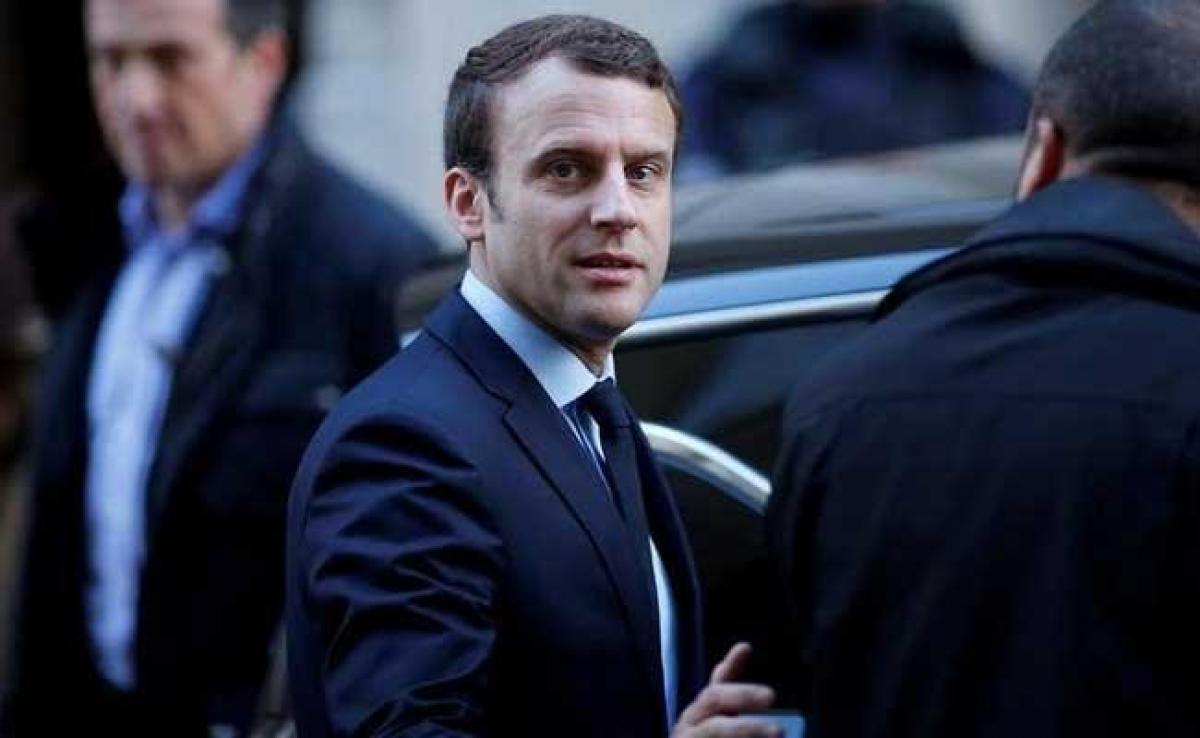Live
- Govt plans to establish offshore Johns Hopkins University Campus in India
- Goa Aces clinch Indian Racing League title
- Study finds how hormone therapy can reshape the skeleton
- High-street fashion players looking at India for manufacturing: Report
- Shreyas Iyer to lead Mumbai as Prithvi Shaw returns for Syed Mushtaq Ali Trophy
- 'Failed to resolve crisis': NPP withdraws support from BJP govt in Manipur
- Chennai: Actress Kasturi Remanded in Custody Until 29th of This Month
- Aaqib Javed likely to become Pakistan's new white-ball head coach
- BJP panel to draft poll charge sheet against AAP govt in Delhi
- Allu Arjun Thanks Fans in Patna, Teases 'Pushpa 2' Release
Just In

France\'s election watchdog attempted on Saturday to stop the spread of hacked documents from centrist presidential candidate Emmanuel Macron\'s campaign, a day before the country heads to the polls for a watershed election.
France's election watchdog attempted on Saturday to stop the spread of hacked documents from centrist presidential candidate Emmanuel Macron's campaign, a day before the country heads to the polls for a watershed election.
Thousands of emails and documents were dumped online by hackers shortly before midnight in France on Friday and were then relayed by anti-secrecy group Wikileaks.
A statement from the 39-year-old frontrunner Macron called it a "massive and coordinated" hack, intended to cause "democratic destabilisation, like that seen during the last presidential campaign in the United States".
Bound by strict rules that ban campaigning on the day before the vote, neither Macron nor his allies were able to respond further as allegations were circulated on social media by his opponents in France and abroad.
"The dissemination of such data, which have been fraudulently obtained and in all likelihood may have been mingled with false information, is liable to be classified as a criminal offence," France's electoral commission said in a statement.
But supporters of Macron's far-right opponent Marine Le Pen published screenshots of documents purportedly found in the hacked files, which the Macron team has warned could include fakes.
Senior Le Pen aide Florian Philippot suggested on Twitter that the leak might contain information the media had deliberately suppressed.
French President Francois Hollande told AFP that authorities would reply vigorously to the hack.
"We knew that there were these risks during the presidential campaign because it happened elsewhere. Nothing will go without a response," he said.
- Unknown impact -
It was impossible to assess the impact of the hacking after an unpredictable campaign marked by scandals, surprises and bitter exchanges between the candidates.
Le Pen and Macron have offered starkly different visions of France during a campaign closely watched in Europe and around the world.
Macron is a pro-business centrist who strongly backs the European Union, while Le Pen promotes an anti-immigration, France-first programme that would roll back the euro and restore checks on national borders.
Macron held a clear and widening lead of around 62 percent to Le Pen's 38 percent in the last polls published Friday before the campaigning blackout.
But turnout is considered a key to the vote, which takes place in the middle of a three-day holiday weekend.
French expats in North America were already casting their ballots Saturday, along with voters in some overseas territories in the Caribbean and Pacific.
At midday local time, around a quarter had turned out in the tiny territories of St. Pierre and Miquelon off Canada, and about a fifth in French Guiana and Guadeloupe, roughly the same proportion as in the first round on April 23.
In the Quebec city of Montreal, a two-kilometre (one-mile) line formed at a ballot station at a local school shortly after it opened.
Voting opens Sunday in mainland France at 0600 GMT, closing at 1700 GMT except in some big cities, where polling stations will stay open until 1800 GMT. Early estimates of the results will be published immediately afterwards.
- Kremlin accused -
During a bad-tempered televised debate on Wednesday, Le Pen brought up unsourced allegations circulating online that Macron had an offshore bank account in the Bahamas -- leading Macron to sue for defamation.
There has been no claim of responsibility for the hack, although links to the files appear to have first surfaced on US online forum 4Chan used among others by far-right activists.
US intelligence agencies believe Democratic candidate Hillary Clinton was hacked by state-backed Russian operatives ahead of the US election last November.
She has said the revelations, spread by Wikileaks, partly explained her shock defeat by Donald Trump.
French Foreign Minister Jean-Marc Ayrault suggested in February that Macron was being targeted by a Russian campaign because of his support for a strong EU that could stand up to Moscow. Le Pen is a eurosceptic who met Russian President Vladimir Putin in March.
Macron's team has previously accused the Kremlin of meddling in the campaign and being behind repeated cyber-attacks on his headquarters -- allegations strongly denied in Moscow.
His campaign said it had employed tough server protections and network encryption.
Macron's team said the files were stolen weeks ago when several members of En Marche had their personal and work emails hacked in one of "an intense and repeated" series of cyber-attacks.
Last month, cybersecurity research group Trend Micro said Russian hackers called Pawn Storm had targeted Macron's campaign using "phishing" techniques in which fake websites are used to trick users into revealing their passwords.
Fresh security fears also surfaced Friday following the arrest of a suspected extremist who had allegedly pledged allegiance to the ISIS group.
The suspect, a 34-year-old Muslim convert, was detained near a military base outside Paris.
The arrest followed an attack on Paris's Champs-Elysees avenue claimed by ISIS in which a policeman was shot dead three days before the first-round vote in April.

© 2024 Hyderabad Media House Limited/The Hans India. All rights reserved. Powered by hocalwire.com







